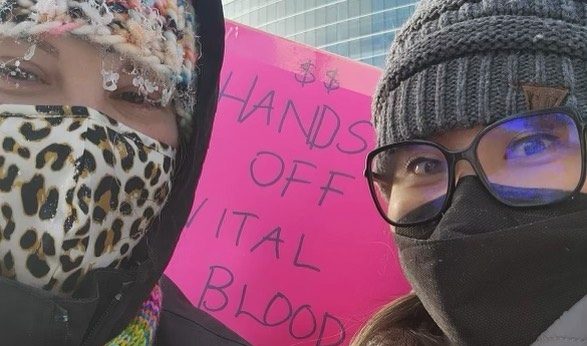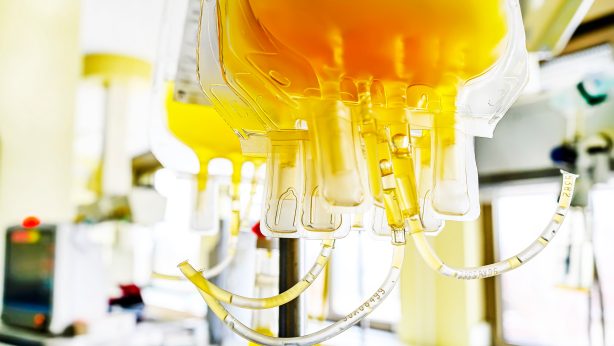Eyes on Ontario after BC slams door on for-profit plasma collection
Advocates for Canada’s safe and voluntary blood supply are focussing their attention on the Ontario government. BloodWatch and Canadian Blood Services staff, who are members of OPSEU, are lobbying MLAs in Queen’s Park this week to enforce the ban on the commercial collection of plasma and keep multinational Grifols out of the province.
Ontario and B.C. both ban the commercial collection of plasma, but Canadian Blood Services has argued the laws leave loopholes that allow its commercial partner, Grifols, to open commercial plasma collection sites in those provinces. Quebec also has a ban in place.
The Canadian Health Coalition, BloodWatch, NUPGE, OPSEU, and others rallied outside CBS headquarters in December opposing the announcement that the non-profit agency would work with Grifols to collect plasma in Canada. Supporters of Canada’s safe, voluntary blood system are concerned that paying plasma donors, as Grifols does, could undermine essential voluntary blood donations and take advantage of economically disadvantaged people.
A showdown has been brewing for months between CBS and Grifols on one hand, B.C. and Ontario on the other, over whether the provinces would uphold the bans despite CBS’s assertions the laws do not apply to CBS and its contract with Grifols.
B.C. slammed the door on CBS and Grifols this month. The law “was not intended to allow a private entity to establish collection sites in B.C. with a donor remuneration model,” B.C. Health Ministry spokesperson Hope Latham said in an e-mail to The Globe and Mail, adding: “We do not anticipate that Grifols would be operating sites in British Columbia.”
Ontario’s Conservative government has been far less clear than its NDP counterpart in B.C. In a letter to the Canadian Health Coalition, Ontario’s Deputy Premier and Health Minister Sylvia Jones wrote, “The ministry will continue to prioritize the safety of patients as we monitor CBS’s approach to plasma collection in Canada.”
The Globe and Mail discovered through documents obtained through an access-to-information request that the Ontario government considered lifting its ban last fall, but ultimately decided to leave it in place. Bloodwatch stated in a Twitter post, “We are troubled to learn that the decision was to then be passive & permit a company to come in & exploit vulnerable populations to sell their plasma.”



